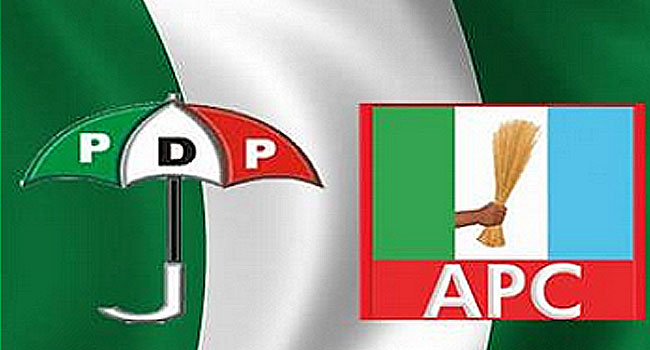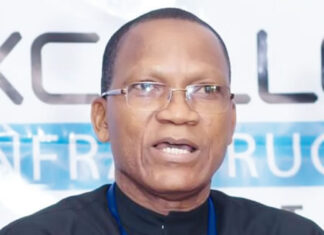By Emeka Alex Duru
It is perhaps, not for nothing that enlightened analysts dismiss the two leading political parties in the country – the ruling All Progressives Congress (APC) and the opposition Peoples Democratic Party (PDP), as the same poison in different bottles. Aside the fluidity of movements by chieftains of the organisations from one to another purely in pursuit of selfish interest, none is anchored on concrete ideological bent. Even as members of the APC appropriate to themselves the unmerited tag of progressives and derisively refer to their counterparts in the PDP as conservatives, they are essentially of the same character, driven more by the urge to remain in power at all times. There are members of the two who have maintained their affiliation with them, despite the odds. These are in extreme minority. But the key issues that have exposed the antics of the two political parties in defrauding Nigerians, are their high sounding, lofty campaign slogans while seeking for votes and eventual low delivery when elected to office.
As in APC, as in PDP
As the bell for 2019 general elections tolls, APC and PDP are back on the familiar track, in reeling out promises to Nigerians. At the launch of its campaign punchline – Next Level on Sunday, November 18, by President Muhammadu Buhari, its flag bearer, APC, painted an enticing picture of Nigeria in the next four years, if given another chance through the ballot.
The next day, PDP presidential candidate, Atiku Abubakar also launched his 2019 presidential campaign with the unveiling of policy documents that contained what he described as his vision to get Nigeria working again. The documents tagged the “The Atiku’s Plan” encapsulated his agenda for a better Nigeria if voted into office.
Each of the candidates struggled to present his political party as one that had more interest of Nigerians at heart, while subtly mocking the other. “We have worked hard to fulfil our promises – and while the road may have been difficult, over the last three and a half years, we have laid the foundations for a strong, stable and prosperous country for the majority of our people” Buhari had claimed in his presentation.
He listed all that his administration has actualised so far and the ones it hopes to do if given another mandate. In what then seemed a challenge to Nigerians to make a choice of tagging with the party for better days ahead or losing out completely, he said, “The next four years will be quite significant for our country. Nigeria is faced with a choice to keep building a new Nigeria- making a break from its tainted past which favoured an opportunistic few. Our choices will shape us – our economic security and our future prosperity”
Atiku threw similar challenge to the voters. Aside a recall on the poor state of the economy and the poor policy thrust of the APC government that appears to have divided Nigerians further on many grounds, he remarked; “The most important question in this election is: are you better off than you were four years ago, are you richer or poorer? That is why our primary focus is to get Nigeria working again.”
According to Atiku, “the two major indices of deterioration in the welfare status of Nigerians in recent times are the increasing rates of youth unemployment and high level of poverty.”
In his policy document, the former vice president said he is targeting a gross domestic product of $900 billion (788 billion euros) by 2025, more than double the current amount and pledged to lift “at least 50 million people out of extreme poverty”.
The presentations from both candidates sounded logical and convincing. But that is perhaps, where the excitement ends, at least, going by the antecedents of the parties.
APC presents Roadmap
While seeking for votes in 2014, APC had made a move that advertised it as taking a decisive step into issue-oriented politics. In what it presented as a 10-point agenda for a new Nigeria, the party listed areas it would focus on to make life meaningful if elected to power in 2015.
Highlights of the presentation included job creation; anti-corruption fight; free; relevant quality education; agriculture; housing plan; and healthcare plan for children and adults.
The party also listed social welfare scheme for the less advantaged as well as road, power plant construction, among its priorities, adding that it will strengthen peace, security and foreign policy.
Its strategies for tackling unemployment included immediate creation of 20,000 jobs per state for those with a minimum qualification of secondary school leaving certificate and who participate in technology and vocational training. The party also floated idea of establishing Technology/Industrial Estates fully equipped with ICT, power and other support across the country to attract and encourage small-scale technology businesses and other entrepreneurs.
It equally unfolded an elaborate agenda against official and/or private sector corruption. Part of its strategies in this regard would be to strengthen legal provisions to prevent stay of proceedings and other delays in corruption trials. It also vowed to “guarantee the independence of anti-corruption and financial crimes agencies by legislation, charging their budgets directly to the Consolidated Revenue Fund”. Regarding security challenges facing the nation, the APC said it would allow states to own local police forces. It promised to establish a serious crime squad to fight terrorism.
Excited by the roadmap and given the dwindling popularity profile of the then President Goodluck Jonathan and his PDP, Nigerians voted for the APC.
Hope betrayed
But nearly four years after, opinions are divided on whether the APC has delivered on its promises. The economy is for instance, still in the woods. It has, in fact, according to experts, slipped further, with unemployment figure assuming more frightening dimensions. Recent data, had put the country’s unemployment rate as increasing steadily since Q2 of 2016 when it stood at 13.30 percent to 18.80 in Q3 of 2017, when Nigeria’s National Bureau of Statistics released the last job figures.
The initial successes attained in containing the menace of Boko Haram insurgents, are gradually being reversed. Shortly after coming to office, the Buhari administration had given the terrorists a determined fight which resulted in recovering about 14 councils they had earlier annexed in the North Eastern part of the country. But with the resurgence of attacks by the insurgents, especially the most recent in Metele, Borno State, which had left over 100 soldiers dead and more reportedly missing, the terrorists may have regained their voice in their deadly campaigns. Aside the Boko Haram menace, the murderous engagements of the Cattle Fulani in the North Central and some parts of the South, are also putting the nation on the edge. Buhari has not incidentally offered a convincing blue print on how to tackle these apparent challenges if elected.
As with Buhari, as with Atiku
Atiku has also not provided a viable alternative. He is for instance, yet to state how his envisaged privatisation of key national institution will be handled to re-float the economy, when as former Vice President and Chairman of the National Privatisation Council, who supervised the exercise in the past, not much was realised from the disposal of such national assets. He has also not pinned down his economic recovery scheme on Naira and Kobo terms. The suspicion by critics is that perhaps, he intends to cash in on the disenchantment among Nigerians on the poor handling of the country by Buhari, to his advantage. His party had reaped from such opportunity in 1999, when it sold to Nigerians an embracing philosophy that it ended up betraying in its 16 years of being in power.
PDP and its ideals
At its formation on July 29, 1998, the facilitators of PDP were guided by far reaching visions. They had for instance dreamed of a party that would put the Nigerian nation on a new phase of political engineering. Part of their intention was to put in place a political platform that would ensure a “re-creation of civil political institutions, reconciliation of Nigeria, rekindling of the spirit of unity and brotherhood in the polity and the revitalization of powers of the people to build a prosperous industrial democracy”. Propelled by these lofty ideals, the founders of the party had aimed at bringing together all patriotic and like-minded Nigerians into a single formidable party capable of renewing and refocusing the loyalties and productive energies of the nation to work for national reconciliation, economic and social reconstruction, respect for human rights and rule of law and to restructure the country in the true spirit of federalism.
Their long term aspiration was to erect a frame work that would ensure a just and equitable distribution of power, resources, wealth and opportunities to conform with the principles of power shift and power sharing, rotation of key political offices and equitable devolution of powers to zones, states and local governments so as to create socio-political conditions conducive to national unity and to defend the sanctity of electoral democracy.
The encompassing principles of the party were adequately complemented by an embracing motto – Justice, Unity and Progress, while the slogan of the party, instructively acceded “power to the people”. To add up, the PDP had in its fold a generous spread of the nation’s first rate politicians. It also appropriated to itself the tag of the largest party in black Africa. In a way, its claim of greatness had paid off as it had garnered many electoral victories, though, often questionable in some cases.
But side by side its victories at the polls, the party, in irony of sorts, had been enmeshed in crises, most of which were incidentally, traced to the contradictions by its successive leadership especially in the conduct of its affairs. But its greatest sin was in abandoning the people. The result is the arty, which at a time, had boasted that it would rule Nigeria for 60 years, is currently in the opposition, having lost power at the centre and in some states previously under its column.













